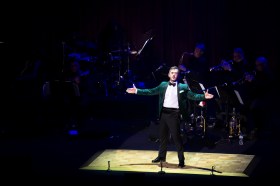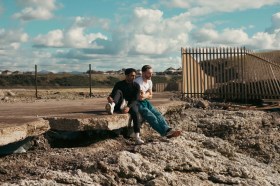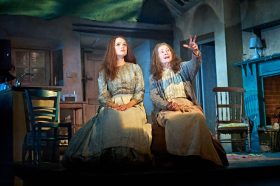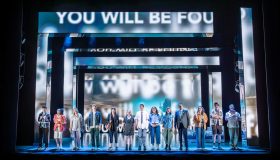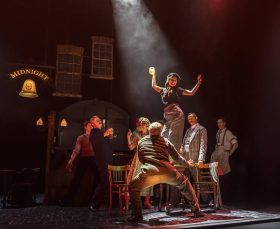John Slater started life in stage management, then became an award winning DJ on BRMB radio in Birmingham, interviewing 1,500 rock musicians on air. His final gig was compering the 1991 Donington festival in front of a 75,000-strong crowd, with AC/DC and Metallica headlining. He went on to tour manage bands – and then did the honourable thing and walked out on rock ‘n’ roll to return to the theatre. He is now a freelance production manager with a penchant for snazzy hats and a love of architecture. Angela Meredith met up with him in the Great Court of the British Museum to admire the view and chat about his career.
You’ve just driven down to London from Weston-super-Mare. What’s that all about?
We’re coming to the end of London Studio Centre’s annual ballet tour. This is my fifth year as production/technical manager. Last night, it was the Playhouse Theatre, Weston and this weekend it’s the Peacock Theatre in London. The dancers are 22 graduating students and the director is Margaret Barbieri, former prima ballerina and star of the Royal Ballet Touring Company (now BRB). She does an extraordinary job of enlisting major talents like Matthew Bourne and Irek Mukhamedov, both of whom choreographed works on this tour.
How did you get a job on local radio?
I was working backstage at Edinburgh Playhouse when I applied for a sound engineering job with Metro Radio in Newcastle. An acquaintance of mine got it and called me to say he would be leaving his job at BRMB. He told me to call his boss in Birmingham – two days’ later I was interviewed in Birmingham and that night I started the job. I never even had a chance to go home to Edinburgh to pack more clothes.
How long did it take you to work your way up to the prestigious drive time slot on BRMB?
I was a sound engineer for three years. That was followed by another three years as holiday cover and presenting after midnight. A regular mid-evening show followed for a few months, until a change of programme director rocketed me to peak time. I was very grateful – he showed a lot of trust in me, and I got a Sony Award in 1987 for UK’s best pop music programme for a weekly pop magazine show called The Pulse. But it was only six months before I asked to go back to evenings, where I was happiest. In that slot, nobody insists you play some nonsense because it’s number one and people are also listening instead of hearing. I spent the final seven or eight years of my time at BRMB in this slot. I fell in love with night-time radio when I was growing up.
As a teenager, you were involved with Radio Caroline, weren’t you?
I made some recordings at Radio Forth, which were sent to Caroline and used on air.
Free radio – is there such a thing?
I’ve not given that any thought for a long time. I can’t answer briefly and I’m surprised to find I still care too much to be flippant.
What’s it like compering a rock gig with an audience of 75,000?
People think if you can play records and talk on radio, you can do the same on stage and vice versa. It’s a whole different job, though, and I have envy and admiration for people who are natural in front of a live audience. I’m not. After a lot of hard work and what are euphemistically called learning experiences, I can get away with it. And if I have to do it, give me a big audience every time – I’d far rather face 10,000 people than 100 any day. I often worked at both extremes of that range – with 1,000 plus, I was okay, I guess. But with 75,000 I had no fear of at all. Don’t ask me to explain.
Did you prefer radio to live gigs, then?
I loved the anonymity and intimacy of radio – after years of avid listening and more years of working in it, it was natural to me. I understood how whole myths and scenes could be conjured for the listener (note the singular) with very little.
Why did you walk out on your radio career in 1991?
When I was still a youthful strip of a thing, I knew what Pink Floyd meant by “Then one day you find/ Ten years have got behind/ And no one told you when to run”. In 1991, I’d been in the same place for nearly 15 years. There are so many stories out there waiting to be told – I wanted to tell more than one of them.
What made you go back into stage management?
It was an accident. I’d been tour managing bands, but a friend, Nick Hennegan, was director of the Maverick Theatre Company in Birmingham and asked me to help him out for a day. I stayed for four years.
You’re now a freelance production manager. What technical and personal skills do you need for that?
I’m sure different people approach the job in different ways. A broad knowledge of lighting, sound, rigging, wardrobe and stage management is a good start. Basic bookkeeping and logistics – an understanding of the needs of the various departments and creative people you’re working with. Then communication skills and staying calm while the best laid plans go into meltdown also helps. And you have to enjoy it. There is no good reason to do this if you don’t enjoy it. I wish I were better at delegating, though.
What does a production manager actually do?
The work varies with the job. In recent years, I’ve been doing a lot of mid- to large-scale dance tours, and usually I’m production/technical manager and re-lights. All technical aspects of the production are generally my responsibility. I have early meetings with the director and designers, source equipment (buy, hire, beg, steal, borrow), find people to build things and oversee the construction – and decide how we’re going to transport it all, as well as how we’re going to put it together at each venue and take it apart again. I then hire the people to help me do it and try to foresee the problems that each different venue will present. Once the first show is done, I try to make the subsequent ones look the same, while all the time keeping accounts, being aware of budgets and making them fit.
What is a typical day like?
There is no typical day – some days I’m in the office and some are spent in rehearsal studios. On this tour, we start at 9am, when the trucks arrive at the venue and we meet the local technicians. Once the trucks are unloaded, we start marking up the stage and go through plans with the local stage manager and chief electrician. Our own stage manager will organise costumes and props, while I oversee the rigging of lights and the set. The lighting focus then gets underway and the sound equipment gets set up. Lunch is at 1pm, while the dancers use the stage for a daily exercise class. By 3pm, the director starts adjusting the choreography to the space, while we work in the wings and on the bridges over the auditorium. I’m programming the lighting desk, re-numbering everything to match the theatre’s system, until the 4pm sound check and technical checks, last-minute rehearsals, etc. At 5.30pm, it stops and we have half-an-hour to get the stage swept, mopped and set up for the start of the show. Running the show is usually the easiest bit, then we have to get everything down, coiled, packed, out of the theatre and onto the trucks in under two hours, or it gets more expensive. Then I have a cup of tea and do it all again the next day.
So, what’s your next job?
I don’t know yet. The gaps don’t last long and usually three jobs turn up at once. It only takes a few days at home before I want to get back to work.
Do you think you’ll ever go back to radio?
Never say never, but these days I love the fact that someone pays me to travel and I also like the people I work with.
If you could play one record again on air, what would you choose and why?
Celebrate by An Emotional Fish because not enough people got it the last time. It was the last record I played on the radio – in fact, not the record but my session recording of it:
“Celebrate/ This party’s over/ I’m going home”.
Any regrets about leaving sex and drugs and rock ‘n’ roll behind?
Left them behind?
